User Research
Libraries are impacted by the ways in which individuals engage with technology; how they seek, access, contribute, and use information; and how and why they demonstrate these behaviors and do what they do. We're collaborating with librarians to shape their services around a set of expectations that have been influenced by consumer technologies and modern research and learning environments. By providing the library community with behavioral evidence about individuals’ perceptions, habits, and requirements, we can ensure that the design of future library services is all about the user. Our efforts are amplified by strategic partnerships and focus in these two areas:
Publications
Narrow by
-
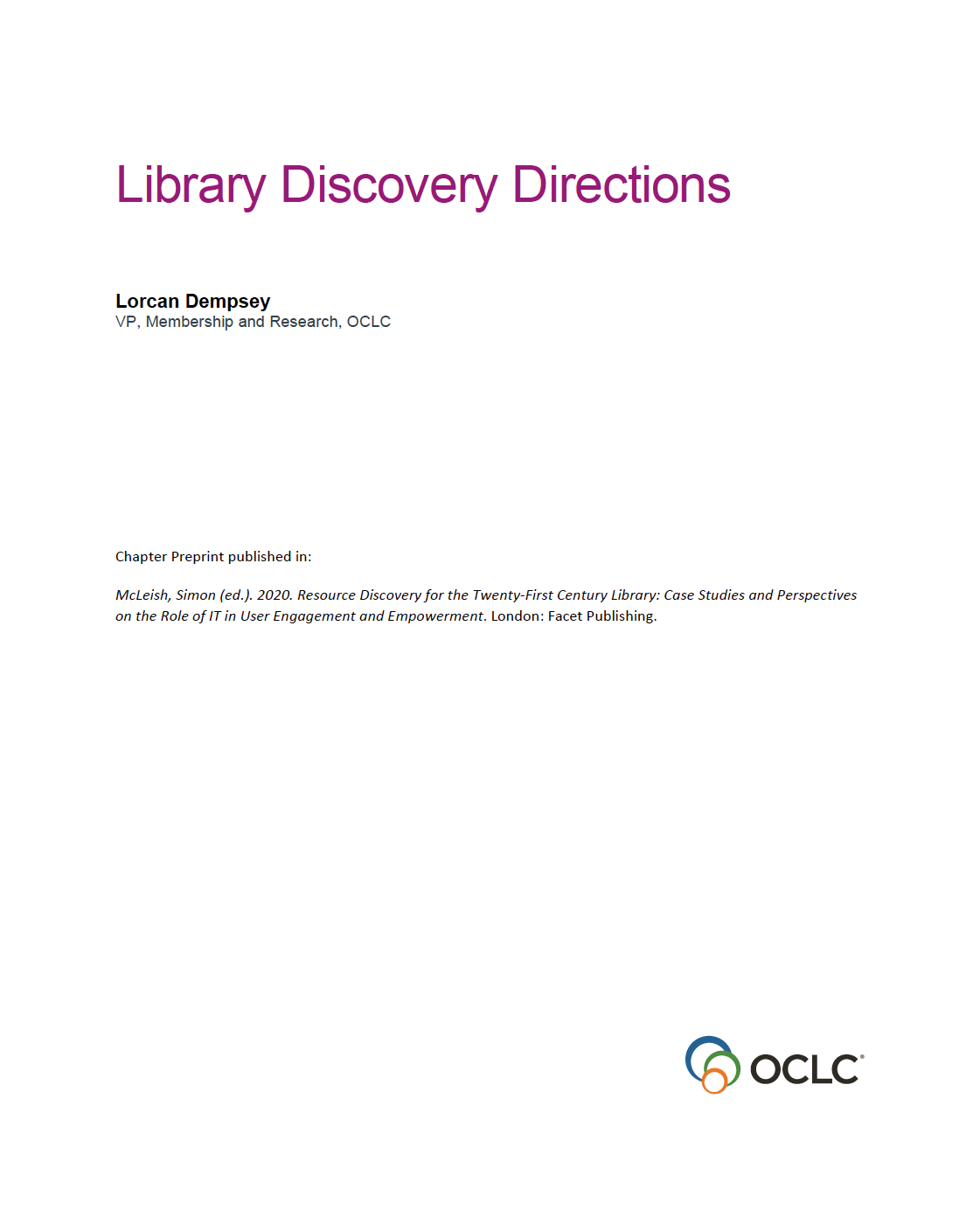
Library Discovery Directions
29 June 2020
Lorcan Dempsey
In this foreword to the edited collection Resource Discovery for the Twenty-First Century Library (2020), Lorcan Dempsey traces shifting trends in the library discovery environment contributing to the diversified scope of resource discovery.
-

Call to Action: Public Libraries and the Opioid Crisis
26 February 2020
Scott G. Allen, Larra Clark, Michele Coleman, Lynn Silipigni Connaway, Chris Cyr, Kendra Morgan, Mercy Procaccini
OCLC has partnered with the Public Library Association (PLA) to issue Call to Action: Public Libraries and the Opioid Crisis, a report that offers strategies for public libraries to consider as they determine a local response to the nationwide opioid crisis. This is the culminating output from the IMLS-funded project Public Libraries Respond to the Opioid Crisis with Their Communities.
-

Science and News: A Study of Students’ Judgments of Online Scientific News Information
13 January 2020
Tara Tobin Cataldo, Kailey Langer, Amy G. Buhler, Samuel R. Putnam, Rachael Elrod, Ixchel M. Faniel, PhD, Lynn Silipigni Connaway, PhD, Christopher Cyr, PhD, Brittany Brannon, Joyce Kasman Valenza, PhD, Erin M. Hood, Randy A. Graff, PhD
This paper explores how students judge scientific news resources, as they might find through a Google search. The data were collected as part of an Institute of Museum and Library Services (IMLS) funded project.
-
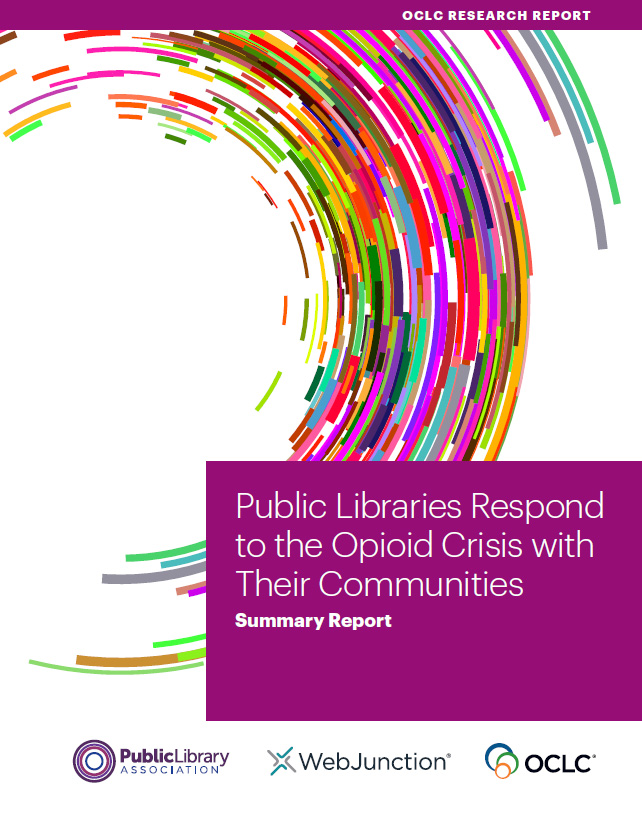
Public Libraries Respond to the Opioid Crisis with Their Communities: Summary Report
29 October 2019
Scott G. Allen, Larra Clark, Michele Coleman, Lynn Silipigni Connaway, Chris Cyr, Kendra Morgan, Mercy Procaccini
As the impact of the opioid epidemic is felt in communities across the US, public libraries are choosing to be part of the community response. With funding from the Institute of Museum and Library Services, and in partnership with the Public Library Association (PLA), OCLC is sharing knowledge and resources that will help public libraries and their community partners develop effective strategies to address the opioid epidemic in America.
-
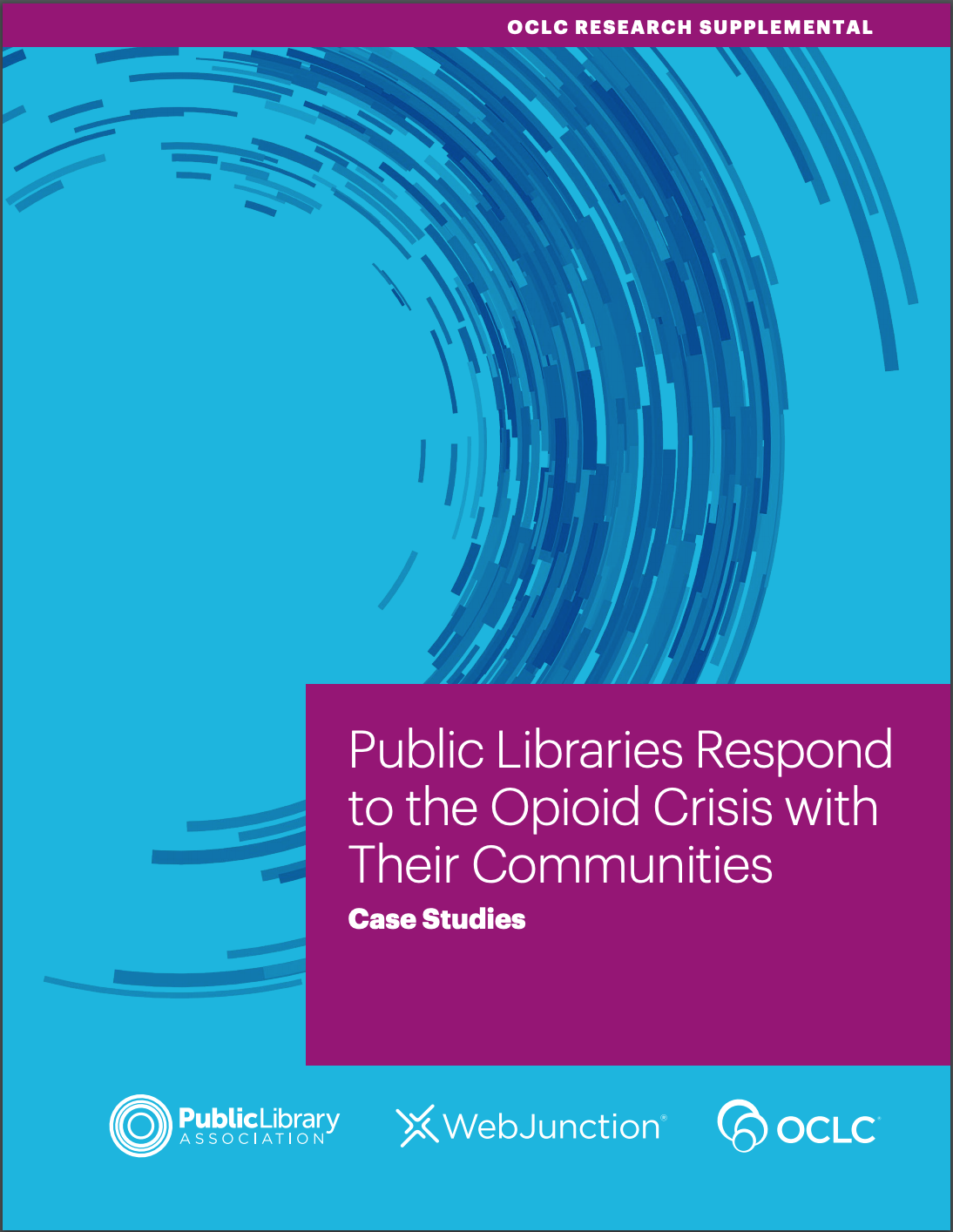
Public Libraries Respond to the Opioid Crisis with Their Communities: Case Studies
28 October 2019
Scott G. Allen, Larra Clark, Michele Coleman, Lynn Silipigni Connaway, Chris Cyr, Kendra Morgan, Mercy Procaccini
This report includes eight research-based case studies highlighting varying opioid response efforts across eight locations in the US. The report details each library's response, the partnerships formed, reactions of the community, outcomes of the efforts, as well as challenges, needs, and opportunities.
-
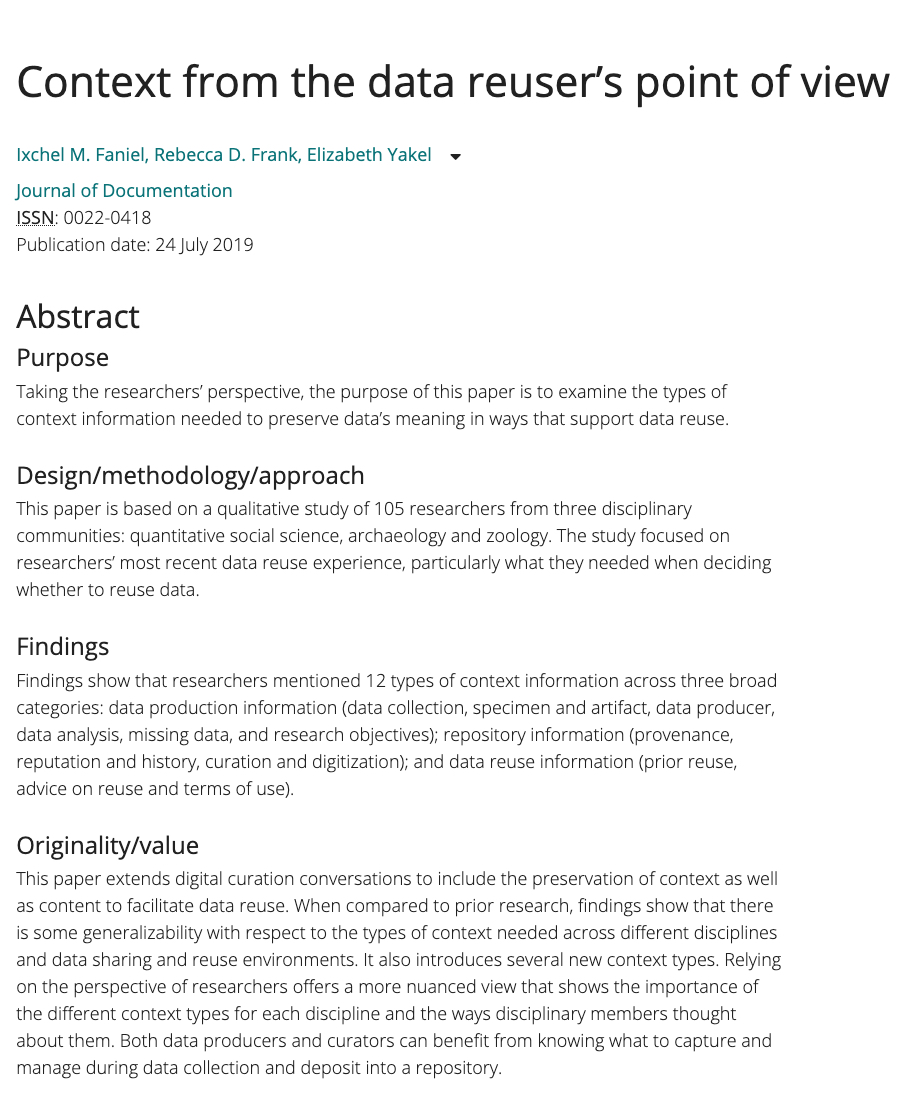
Context from the Data Reuser’s Point of View
26 September 2019
Ixchel M. Faniel, Rebecca D. Frank, Elizabeth Yakel
Context is critical for data reuse, and digital curation should include both context and content preservation. Both data producers and curators benefit from expanding context categories to better determine what information is vital to capture and manage during data collection to support data reuse.
-
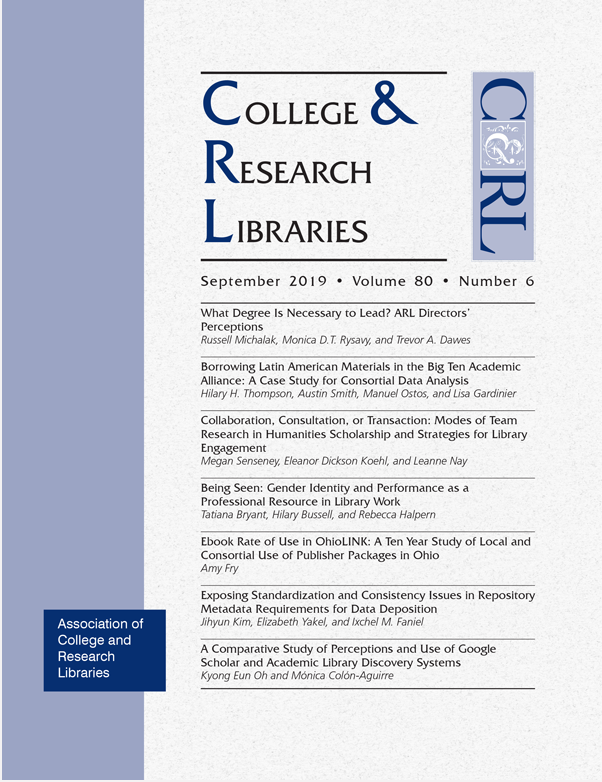
Exposing Standardization and Consistency Issues in Repository Metadata Requirements for Data Deposition
1 September 2019
Jihyun Kim, Elizabeth Yakel, Ixchel M. Faniel
In this article in College & Research Libraries Journal, the authors examine common and unique metadata requirements and their levels of description, determined by the data deposit forms of 20 repositories in three disciplines—archaeology, quantitative social science, and zoology.
-
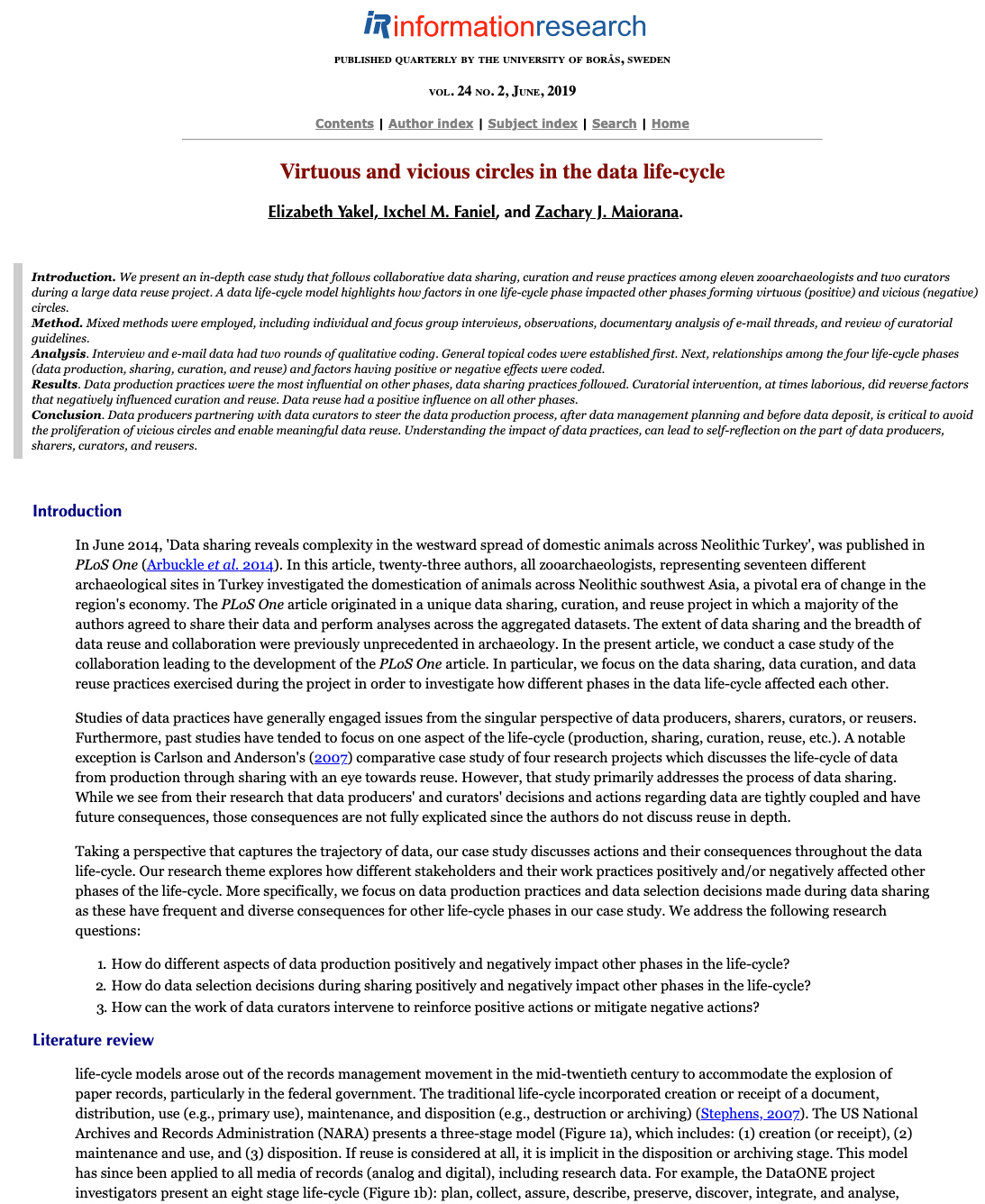
Virtuous and Vicious Circles in the Data Life-cycle
2 June 2019
Elizabeth Yakel, Ixchel M. Faniel, Zachary J. Maiorana
A data life cycle model illustrates how factors in one data life cycle phase impacts other phases, forming virtuous (positive) and vicious (negative) circles. This method comprehensively studies how data producers, sharers, curators, and reusers can better collaborate across data life cycle phases.
-
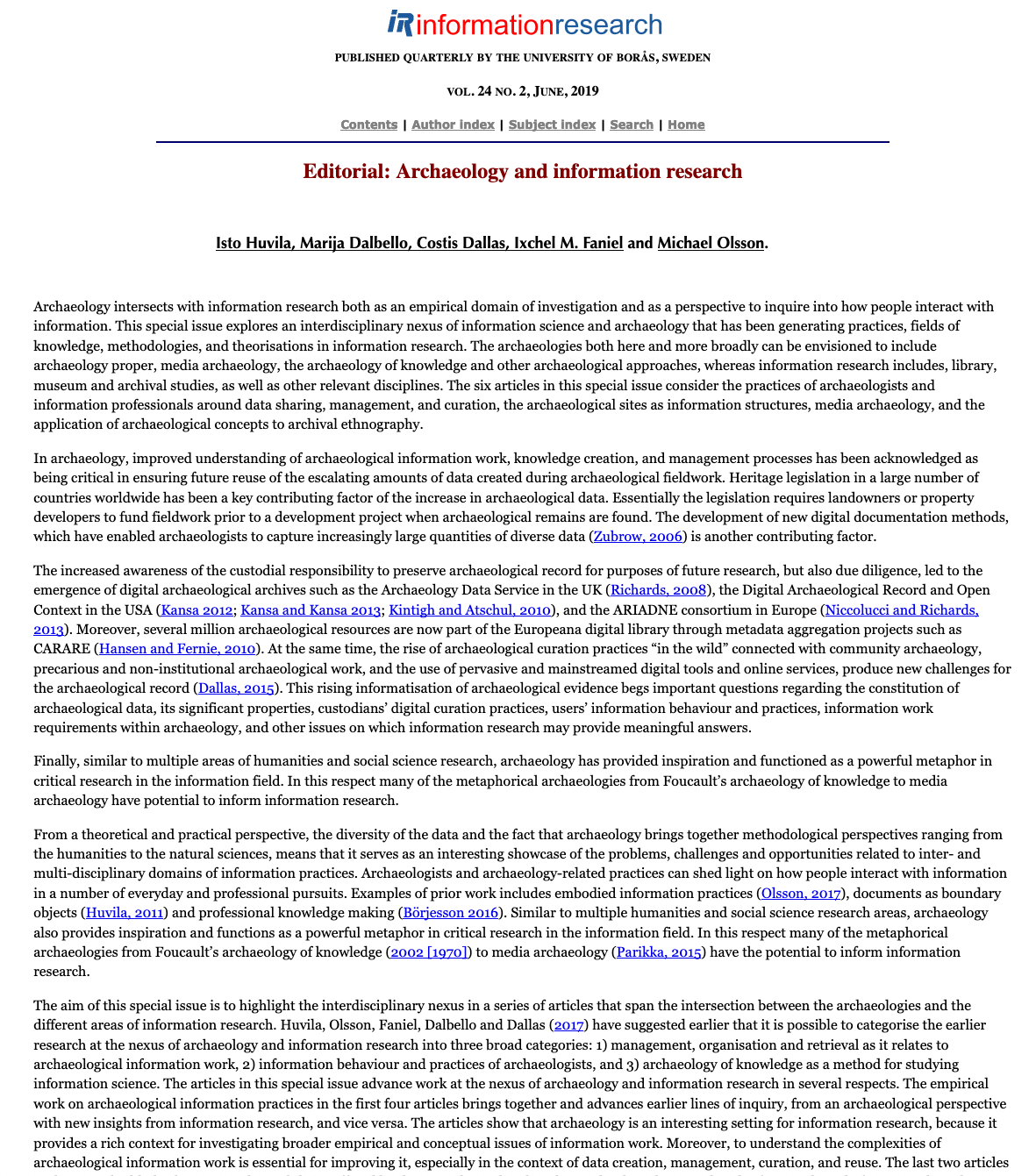
Editorial: Archaeology and Information Research
1 June 2019
Isto Huvila, Marija Dalbello, Costis Dallas, Ixchel M. Faniel, Michael Olsson
This editorial provides an overview of an issue of Information Research that studies the interdisciplinary nexus of archaeology and information research. This includes shared methods of data sharing, management, and curation; archaeological sites as information structures; media archaeology; and archaeological concepts in archival ethnography.
-

Authority, Context and Containers: Student Perceptions and Judgments When Using Google for School Work
7 May 2019
Tara Tobin Cataldo, Kailey Langer, Amy G. Buhler, Samuel R. Putnam, Rachael Elrod, Ixchel M. Faniel, PhD, Lynn Silipigni Connaway, PhD, Christopher Cyr, PhD, Brittany Brannon, Joyce Kasman Valenza, PhD, Erin M. Hood, Randy A. Graff, PhD
What really happens when student researchers meet a Google results page? How do students determine the authority behind each result? News, blogs, journals, Wikipedia, websites, e-books--with the vast array of online content available, how do students differentiate between them? Better still, do they differentiate between them or are these format agnostic students stymied by container collapse? The Researching Students’ Information Choices (RSIC) project is answering these questions.